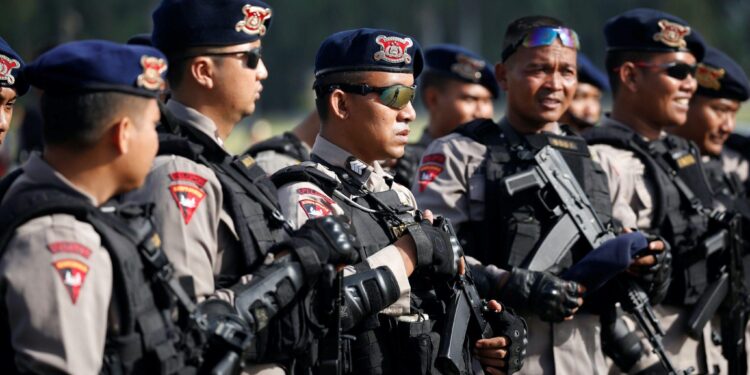In a tense clash between law enforcement and student demonstrators, Indonesian police deployed tear gas and rubber bullets to disperse crowds during a protest in Jakarta on Wednesday. The students, advocating for a range of social and political reforms, took to the streets in response to rising discontent over government policies and economic challenges plaguing the nation. The situation escalated as police aimed to maintain order and prevent the protests from gaining momentum, leading to a chaotic scene that saw hundreds of students confronting officers in a display of defiance. With the ongoing protests highlighting deep-seated frustrations in Indonesian society, the government’s response has sparked widespread condemnation and raised questions about the balance between maintaining public safety and respecting citizens’ rights to peacefully assemble.
Indonesian Police Clash with Student Protesters: A Look at the Rising Tensions
The ongoing clash between Indonesian police and student protesters has escalated rapidly, highlighting the growing unrest among young people in Indonesia. Students have taken to the streets to express their discontent over various issues, including rising tuition fees, government corruption, and a lack of job opportunities. In response, police deployed tear gas and rubber bullets to disperse the demonstrators, resulting in chaotic scenes across the capital. Videos circulating on social media depict thick clouds of tear gas engulfing protesters as they attempt to shield themselves and regroup.
The rising tensions reflect a broader pattern of dissatisfaction among youth who feel increasingly marginalized by their government. The protests have drawn attention to key grievances, such as:
- High Education Costs: Many students argue that increased tuition fees are making education unattainable for low-income families.
- Corruption: Protesters demand transparency and accountability from their leaders, expressing frustration over ongoing scandals.
- Employment Issues: The lack of job opportunities for graduates has become a significant concern, prompting calls for government action.
These incidents are not isolated but part of a larger movement, with students across the nation uniting to voice their demands for change.
The Impact of Tear Gas and Rubber Bullets on Civil Liberties and Public Safety
The recent incident involving the Indonesian police’s use of tear gas and rubber bullets against student protesters has raised significant concerns regarding the balance between law enforcement practices and civil liberties. The deployment of these crowd control measures can often lead to a rapid escalation in violence, potentially resulting in injuries not only to demonstrators but also to innocent bystanders. As law enforcement agencies justify the use of such methods to maintain public order, questions arise over the proportionality and necessity of these tactics when managing peaceful protests.
Furthermore, the implications for public safety are profound. The use of tear gas and rubber bullets can have immediate health consequences, including respiratory issues and physical harm. There is also a lasting impact on citizens’ rights to assemble and express dissent, potentially creating a chilling effect on future demonstrations. This cycle of violence and fear can undermine the very democratic principles that protests aim to uphold, leaving a lasting scar on the relationship between the state and its citizens. The ongoing debate thus centers on finding a balance that protects both public safety and the fundamental rights of individuals to freely express their beliefs.
Calls for Dialogue: Recommendations for Addressing Student Grievances and Ensuring Peaceful Protests
In light of the recent clashes between Indonesian authorities and student protesters, a pressing need for open communication channels is essential for resolving grievances. Education sector stakeholders, including university administrations, government representatives, and student organizations, should convene regularly to discuss pressing issues affecting students. Establishing a formal mechanism for dialogue could lead to practical solutions and foster an atmosphere of trust. Proactive measures such as mediated discussions or roundtable forums can help bridge the gap between student demands and governmental policies. These dialogues must be inclusive, ensuring that diverse student voices are heard, particularly those from marginalized groups.
Moreover, an emphasis on non-violent protest tactics should be encouraged to maintain peace and minimize tensions. Institutions can develop guidelines for peaceful activism, educating students on the importance of responsible discourse. The following strategies could enhance peaceful engagements while addressing grievances effectively:
- Workshops on Conflict Resolution: Train students in negotiation and mediation skills.
- Regular Listening Sessions: Implement monthly meetings where students can express concerns to authorities without fear of reprisal.
- Collaborative Policy Development: Involve students actively in shaping policies that impact their educational experience.
- Resource Accessibility: Provide channels for students to access mental health support and conflict resolution resources.
| Issue | Recommendation |
|---|---|
| Student Fee Increases | Conduct stakeholder discussions to assess the impacts and explore alternatives. |
| Academic Freedom | Establish clear policies that protect student expression within academic discussions. |
| C campus Safety | Create a student-led safety committee to address concerns and suggest improvements. |
In Conclusion
In summary, the recent clashes between Indonesian police and student protesters underscore the rising tensions surrounding political and social issues in the country. As demonstrators gathered to voice their demands for reform and greater accountability from the government, the police’s response with tear gas and rubber bullets has drawn widespread condemnation from various quarters. Activists and human rights organizations are calling for an urgent reassessment of law enforcement tactics, emphasizing the importance of dialogue and peaceful assembly in a democratic society. As the situation continues to unfold, the eyes of the nation-and the world-remain focused on Indonesia, where the balance between maintaining order and respecting citizens’ rights is being tested. Further developments are expected as both sides respond to the unfolding crisis, raising critical questions about governance, dissent, and civil rights in the archipelago nation.














